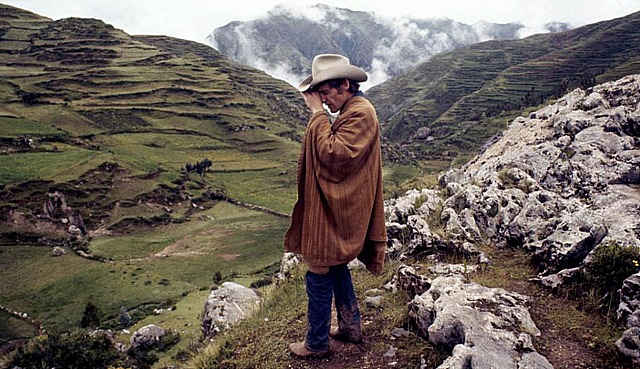I’ve never seen Dennis Hooper‘s The Last Movie, which has been commonly regarded for decades as a legendary artistic embarassment and financial catastrophe, not to mention the film that killed Hopper’s directing career for over a decade. And yet it’s playing for a week at the Metrograph, starting tomorrow. And I’m asking myself “how many opportunities am I likely to have in the coming years to see this infamous creation in an allegedly restored condition on a first-rate theatre screen?” The answer may be “never again,” and so I’m tempted to catch a late afternoon show.
This is partly due to a near-breathless Village Voice review by Bilge Ebiri, titled “Dennis Hopper’s The Last Movie Is as Essential as Cinema Gets.” He calls it “one of the great lost films of the ’70s,” a statement that deftly sidesteps whether or not it’s any good.
He also says that The Last Movie “benefits from multiple viewings the way 2001: A Space Odyssey or Eraserhead or The New World do; you catch through-lines and details you’d missed earlier, while also developing new mini-fascinations and obsessions. It’s the rare film that seems both clearer and completely different with each viewing. The representational fissures of cinema — the tension between the real and the imaginary, between imitation and inspiration — have been woven into its very fabric.”
Toward the end of the review Ebiri calls The Last Movie Hopper’s “greatest ruin and his greatest triumph,” and says that it leads the viewer to “ask whether anyone but Hopper, the veteran character actor who became an unlikely counterculture figure after Easy Rider, could have made this film. And could The Last Movie have had any other fate than to [send Hopper] off to wander the winds of infamy, a man become a myth, and a myth become a man?”
See what I mean? Ebiri’s prose quickens the pulse. How bad could The Last Movie be? It has to be worth at least one viewing, right?
Then I came upon a sentence that gave me pause: “There is an excellent documentary about this chaotic, destructive period in Hopper’s life, called American Dreamer, which is also a lost classic.” Uhm, no…wrong. I saw American Dreamer back in 2010 and here’s a portion of my review, which I titled “American Boob“: “I was stunned by the doc’s shapeless sloppiness, and amused and repelled by its portrait of Hopper as a bearded, drug-fried horndog on the verge of destroying his directing career with the abomination that was The Last Movie.
“What a shameless, self-absorbed, cowboy-booted asshole [Hopper was back then]. Watching American Dreamer is enough to make you at least consider the Sean Hannity-Bill O’Reilly-Glenn Beck view of the changes brought about by the counter-culture. And that’s a terrible thing to do to any viewer.”
If Ebiri can’t be trusted about American Dreamer, can he be trusted about The Last Movie? I wonder.
Consider Vincent Canby’s 9.30.71 N.Y. Times review: “The Last Movie is an extravagant mess, described by its publicity material as ‘an allegory concerning the destruction of innocence,’ in which ‘the naive dreams involved are the agents of death, when sophisticated games become more absurd than the mind can tolerate…’ I don’t know about any one else, but my mind had a good deal of trouble tolerating the inflated pretensions of Hopper, who, it’s now apparent, is gifted with all of the insights of a weekend mystic who drives to and from his retreat in a Jaguar.
“Specifically, The Last Movie has to do with the effect that a Hollywood movie company has on the Indian inhabitants of a small Peruvian village, high in the Andes, during and after the production of a potboiler about Billy the Kid. It’s also about a mythic movie cowboy named Kansas (Hopper), who stays on after the filming and, like the Indians, so loses sight of reality that he finds himself believing the situation as the Indians set about pretending to film a sort of Western movie Passion Play, with Hopper as you‐know who.
“When, occasionally, coherence threatens, The Last Movie becomes bearable. There are some funny scenes of the Billy the Kid production, with Sam Fuller, the legendary but real movie director, playing the director within the film. There is also, somewhere around the middle of The Last Movie, a beautifully satiric and sad sequence involving Kansas with an American businessman, who manufactures brooms in Peru, and the American’s nasty wife (very nicely played by Julie Adams, who is, in real life, an artifact of the old Hollywood to which Hopper keeps referring).
To make his Last Movie, Hopper seems to have had the resources necessary to transport to Peru a huge Hollywood company that included, in unrecognizable bit roles, people like Peter Fonda, John Phillip Law, Severn Darden, Jim Mitchum and Dean Stockwell. They must have had a ball, photographing each other and the local color, and I have no doubt that fantasy and reality did become confused, at least to the extent that The Last Movie itself comes to look every bit as indulgent, cruel and thoughtless as the dream factory films it makes such ponderous fun of.
“Hopper’s movie troupe also included the talented Laszlo Kovacs, whose camerawork was one of the best things about Easy Rider. As a result, The Last Movie has enough visual style to suggest that it really does have something on its mind. That, however, turns out to be just another fantasy.”










